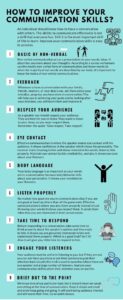How To Easily Improve Your Communication Skills In 5 Minutes
Give me 5 minutes and I’ll show you exactly how to improve your communication skills.
It’s simple.
It’s fast.
It’s easy.
But if you insist on communicating as you are.
Then here’s what you’ve got to look forward to;
- Unhappy customers that walk and shout about how awful you are.
- A loss in revenue that comes from losing customers.
- You’ll even miss opportunities to attract new customers.
- Which brings demotivated staff with low morale.
- Staff that leave.
- Legal issues.
- And you’ll hate working with people.
You may even decide that it’s not worth all the stress.
But here’s the worst part.
Grammarly conducted a study on communication. It shows that poor communication costs businesses £1.2 trillion each year.
Three in four business leaders (72 percent) say their team struggled to communicate well.
Most business leaders (82 percent) are worried about communication.
And even most employees (59 percent) are concerned about effective communication.

How To Improve Your Communication Skills
Why is communication such an important skill to improve?
Effective communication is the lifeblood of any successful business.
Without it, organisations can spiral into chaos.
Poor communication can lead to confusion, misunderstandings, and wasted time and resources.
It can also damage relationships with customers and employees.
Which leads to lost business and decreased morale.
So getting it right can make a big difference.
It can be the difference between an underperforming business and one that thrives.
When communication is effective, it can have a profound impact on productivity.
Have you ever worked or spoken with a master communicator?
Someone that inspired you.
That’s why learning to improve your communication skills is so important.
But there are other times when it can be important.
When employees can communicate in a clear and efficient way with each other, it makes magic.
And it makes everybody feel SAFE.
That often leads to stronger relationships.
When the team feels that they can trust each other it creates a special environment.
They become more likely to work harder and go above and beyond to achieve company objectives.
Another important aspect of communication in business is customer satisfaction.
Good communication can help you to understand your customers’ needs.
They all have different preferences. When you know what they are you’ll have happy customers.
Great communication can also help to resolve issues and conflicts.
That’s going to prevent a ton of problems.
And stop them from becoming major headaches for the business.

How To Improve Your Communication Skills?
Where do most companies get it wrong with their communication?
Communication is key to any business. Unfortunately, most companies struggle to get it right.
The consequences of poor communication can be harsh.
But poor communication often leads to misunderstandings, conflicts, and missed opportunities.
So where do most companies go wrong?
One of the biggest mistakes that companies make is failing to listen.
Notifications are pinging.
That awkward conversation they had with their team member is still playing over in their head.
Or they’re thinking about anything… everything, other than what the person is communicating.
Often, people and companies are too focused on getting their own message across. Then they fail to engage in meaningful dialogue.
It can lead to frustration, miscommunication, and a lack of trust among team members.
That’s only going to lead to confusion and poor performance.
Which can also lead to missed opportunities and a lack of alignment among team members.
Finally, many companies use confusing language that can be difficult to understand.
You don’t understand each other.
Companies that use jargon or technical language may alienate customers and staff who don’t get it.
That makes them feel UNSAFE.
When people don’t feel safe, because they feel stupid, or they worry about speaking up…
And communication falls through the floor.
The most impressive skill of a great communicator is to make people feel safe.
That means using “yes and…” instead of chopping them down.
It means giving them positive strokes rather than kicking them.
To avoid common communication mistakes, you must make a conscious effort.
It’s time to start listening.
You’ll also need to use language that is easy to understand.
Then you can build trust and achieve your objectives.

How to build trust with communication
What can I do to improve the communication in our business?
Okay, let’s get to the good stuff!
You know that communication is important, but what can you do to improve it in your business?
Here are some tips that will help you take your communication game to the next level.
First, pay attention to nonverbal communication.
This means taking note of body language, facial expressions, and tone of voice.
Nonverbal cues can tell you a lot. Often they tell you more about someone’s thoughts and feelings than their words.
Next up, record or watch yourself speaking.
This may seem a bit awkward, but it’s a great way to identify areas where you could improve. There is no greater development technique. Whether it’s in sales, coaching, or public speaking. By listening to yourself or watching a video, you can start to pinpoint things.
Things like filler words, pauses, or body language that may detract from your message.
Third on the list, listen more than you talk.
Many of us are guilty of thinking about what we’re going to say next.
Instead of listening to the person speaking.
By taking the time to listen to what someone is saying, you can see so much more.
It will also help build stronger relationships, avoid misunderstandings, and achieve better results.
Next, take part in group communication exercises.
Something that requires communication, such as a group puzzle or game.
If you’re practicing communication in a low-pressure setting, you can grow. It means you can build your skills and confidence without worrying about messing up.
Finally, study communication.
There are countless books, courses, and resources available.
Any of them can help you improve your communication skills.
Take the time to read up on the topic. Or attend courses, events and seminars, or seek out a mentor or coach who can provide guidance and support.
If you follow these tips, you’ll be well on your way to improving communication in your business.
How to improve your communication bonus tip
One of the most important parts of communication is making people feel safe.
That means creating an environment where people feel comfortable expressing themselves.
Where they feel happy when sharing ideas without fear of judgement or negative repercussions.
One way to do this is to avoid challenging people during communication.
When someone feels like they’re under attack or like you’re criticising them, they shrink.
Then they are much less likely to be receptive to what you’re saying.
Another strategy is to use “yes and” instead of “no because” or “yes but”. When you say “yes and”, you acknowledge and build upon someone’s idea.
But when you use “no because” or “yes but” it can often come across as dismissive or critical.
And when people feel rejected or criticised they don’t feel safe.
And when they don’t feel safe, they don’t perform.
This simple language shift can make a big difference in how people feel.
When people feel safe, they are more likely to engage in open and honest communication.
It often leads to better collaboration and increased innovation.
And brings greater success to your business.
So, take the time to create a culture of safety and respect in your workplace.
Then sit back and watch as your communication improves and your business thrives.
Summary
When you get the communication in your business wrong, it can lead to disaster.
If you come across in the wrong way, customers often leave.
And they tend to share their experience.
And they also share their experience.
Plus, it becomes difficult to make new sales.
Or gain traction in marketing if your communication sucks.
So you have to get it right.
By following the tips we mentioned above.
Pay attention to nonverbal communication.
Record or watch yourself speaking.
Listen more than you talk.
Take part in group communication exercises.
Communication is not only about getting your message across.
But also about creating an environment where people feel safe.
Safe to share their ideas and opinions.
If you get this right you can improve communication in your business.
And foster a culture of collaboration and innovation.
Remember, make people feel safe. It’s a key factor in creating a productive and positive business.
Avoid challenging language and use “yes and” instead of “yes but”.
That way, you’ll get the truth when they reply.
Instead of a defensive response.
It will help you create a culture of safety and respect.
Then sit back and watch as your business flourishes.
Have you found anything super useful when it comes to communicating? If so, share it below.









